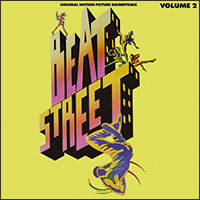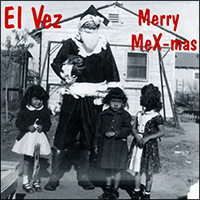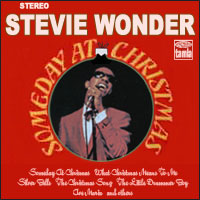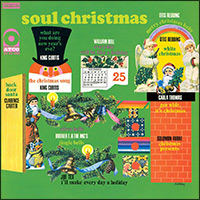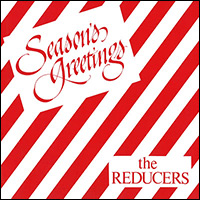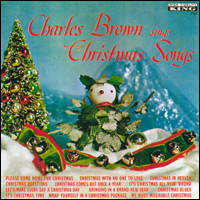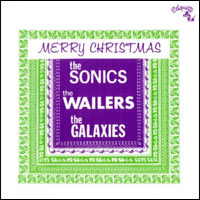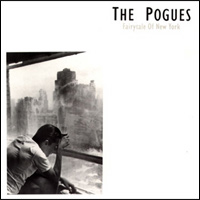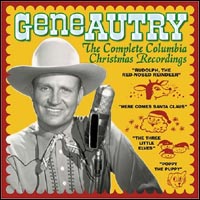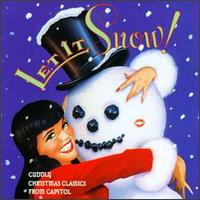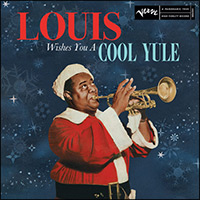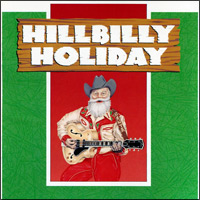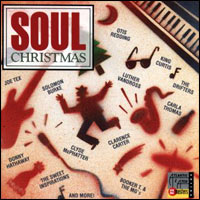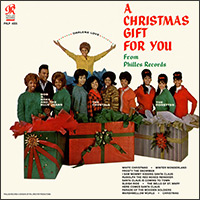
Top 100 Christmas Songs
...and counting
- Santa's Rap, Treacherous Three (Atlantic, 1984)
The Treacherous Three is a storied trio of hip hop pioneers best remembered for two things - spawning rap star Kool Moe Dee and performing "Santa's Rap" in Beat Street (1984), one of several hip hop flicks from the early 80's. Like many great rap records, "Santa's Rap" (which also features Doug E. Fresh - not a regular member of the crew) is both scabrous and side-splitting, a bleak tale of ghetto holidays leavened by ribald jokes and well-played dozens. In the hood, we learn, Christmas is tough. "The last so-called Santa that came in with a sack," explains group member Special K, "wasn't giving out presents, he was taking 'em back." Kool Moe Dee asks, "If the economy is getting better, getting better for who?" Before we're done, Santa is on welfare, reduced to eating his own reindeer.
Interestingly, "Santa's Rap" was originally released under the title "Xmas Rap," an R-rated, six-minute jam on a Sugar Hill 12-inch single. For the movie, it was renamed "Santa's Rap," and edited down to less than four minutes. But, weirdly, while the curse words are heard in the movie - there's one "ass," one "fuck" and two "shits" - they are bleeped on all the Atlantic soundtrack releases, including a 7-inch single and a 12-inch LP. What's more, when the track started showing up for download and streaming, it was still censored! Thankfully, the full-length, unexpurgated version was reissued in 2000 by Sequel (an English label) on their Turn It Up compilation under the original title, "Xmas Rap." It was worth the wait, and it's worth hunting down.
It's worth noting that there were two Beat Street soundtrack albums, and "Santa's Rap" was on the second volume. Also, to confuse matters even further, the song was reissued in 1990 under the title "Christmas Rap" as the b-side of Kool Moe Dee's Sugar Hill single "The Down Beat." Then, a three-minute edit of that was included on The Greatest Hits (1991), a compilation of old Treacherous Three recordings issued under Kool Moe Dee's name to capitalize on his newfound popularity as a solo artist for Jive Records. [back to list]
- Feliz Navi-Nada, El Vez (Sympathy For The Record Industry, 1994)
El Vez (nee Robert López) specializes in mashing up Elvis Presley songs with unexpected rock classics - plus a healthy dose of ethnically-charged humor. At this late date, López's early career in pioneering West Coast punk bands the Zeros and Catholic Discipline has long been overshadowed by his flamboyant, Mexi-centric alter ego. El Vez's annual Christmas shows, especially, are truly phenomenal. In comparison, his Christmas records are mere souvenirs. All the same, several songs convey the magisterial madness of El Vez having fun onstage, especially "Feliz Navi-Nada," wherein he fuses Jose Feliciano's Hispanic classic, "Feliz Navidad," with Sex Pistol John Lydon's solo debut, "Public Image." This sort of thing is El Vez at his finest: Hearing those two songs played in tandem is absolutely the last thing we would expect. But, El Vez not only dares to do so, he pulls it off with demented aplomb. Hard to say if there is some sort of cultural subtext here, but the joke works either way.
It's worth noting that two versions of "Feliz Navi-Nada" exist, one from Merry Mex-Mas, his first holiday album, and another from Happy Birthday, Baby Jesus: The Second Coming, a collection from indie label Sympathy For The Record Industry (both released in 1994). To my ears, it sounds like both versions employ the same backing track. But the Baby Jesus version has a distorted, messy vocal, some extra guitar feedback, and some studio chatter at the end. In short, it sounds more "punk." Logically, then, that version can also be found on Rhino Records' collection Punk Rock Xmas. [back to list] [learn more]
- Someday At Christmas, Stevie Wonder (Motown, 1966)
One of the finest, most magnanimous protest songs ever incorporated into the Christmas tradition, Stevie Wonder's "Someday At Christmas" calls the bluff of all that "peace on earth" crap. This song (written by Motown staffers Ron Miller and Bryan Wells) was a brave step for Berry Gordy's company. This was 1966, a turbulent time in an America deeply divided over the Vietnam War, and "Someday At Christmas" clearly states that violence against our fellow man is folly. Not yet known for such bold statements, Motown risked alienating the mainstream audience they'd worked so hard to win. Happily, they didn't, and "Someday at Christmas" was a modest success, reaching #24 on Billboard's Christmas chart.
"Someday at Christmas" was released first as a single, and the following year it served as the title track of Wonder's otherwise middlin' holiday album. So, the better choice is arguably the 1973 compilation, A Motown Christmas, a magnificent distillation of the label's numerous holiday albums (read about it). You'd be forgiven, by the way, if you prefer "What Christmas Means To Me," the other standout track on Wonder's album. It's great, too, and certainly more typical of Motown's effervescent magic - and A Motown Christmas has both, by the way. [back to list] [learn more]
- Merry Christmas Baby, Otis Redding (Atco, 1968)
A number of songs from Atco's landmark 1968 collection Soul Christmas made my Top 100, and Otis Redding's rendition of Charles Brown's "Merry Christmas Baby" is one of that album's most radical reinterpretations. If you don't listen to the lyrics carefully, you won't even recognize the song. Recorded in Memphis in 1967 (but unreleased till after Redding's death later that year), Otis' "Merry Christmas Baby" is built around Booker T. Jones' buoyant organ, Steve Cropper's insistent guitar riffing, and merrily trilling horns. It contrasts strongly with Brown's easygoing original, as well as Redding's other Soul Christmas contribution - a bleak "White Christmas." Altogether, it's a remarkable performance, and it sets a whole new template for the song. Artists as impressive as Bruce Springsteen (on A Very Special Christmas) have opted to emulate Otis Redding, not Charles Brown, when they've cut their own interpretations of the song. ("Merry Christmas Baby" and "White Christmas" were also released as a single in 1968, with both sides hitting Billboard's Christmas chart at #9 and #12, respectively.) [back to list] [learn more] - Nothing For Christmas, The Reducers (Rave On, 1988)
Founded in 1978, the Reducers were a band from New London, Connecticut, that combined the energy of punk with the East Coast working-class aesthetic of Bruce Springsteen and Joe Grushecky. The Reducers had quite a run, once being voted as "Best Unsigned Band in America" by now-defunct magazine CMJ, but they never made the leap to the majors and broke up in 2012. Their 1988 single "Nothing For Christmas" was a great slab of loud pop that updated the old novelty "Nuttin' For Christmas" for the post-modern age. Our hapless hero boasts that he has "pissed off everyone I know" and will spend the holidays contemplating his sins. "They didn't even invite me!" he gripes. No wonder, really, since "Mom and Dad think I'm a creep."
The band wrote "Nothing For Christmas" as something of a joke - a thumb-in-the-eye of the holiday season. Ironically, the song became a fan favorite and a frequent feature in the Reducers' set list. In 2020, the band's Peter Detmold told Connecticut Public Radio, "I still feel the same way about Christmas songs - I’m just not into it. Like, at a certain point, radio stations start playing Christmas music, and I kinda hate it. I wish there was more stuff out there like our song.” Me too, Peter!
"Nothing For Christmas" was originally released on a vinyl 45 titled "Season's Greetings" backed with a rockin' "Auld Lang Syne," which was later released for download and streaming. In 1991, the band included the a-side on their retrospective album, Redux. All are available through the Reducers' Bandcamp page, and "Nothing For Christmas" was also featured on the 2002 benefit project, Ho Ho Ho Spice: A Hospice Awareness And Benefit Project. [back to list]
- That Punchbowl Full Of Joy, Sonny
Columbus & His Del Fuegos (Boston Rock, 1983)
"That Punchbowl Full Of Joy" is a paean to drunken debauchery and the only original song on the rare and wonderful EP, A Boston Rock Christmas (1983). Sonny Columbus was the stage name of one James Ryan, who was originally from Columbus, Ohio. He was best known for playing in another Beantown band, the Swinging Erudites, who were a lounge revival act before there even was such a thing, and his day gig was running Hoodoo Barbecue, a legendary musician's hangout. He was characterized at the time as a "deranged and highly active alcoholic," and that's not hard to believe given the horny inebriation that gleefully fills his "Punchbowl" to the brim.
Sonny envisions no less than "a million women by the mistletoe, lined up and ready to go," and he sounds capable of servicing every single one - despite the fact that he refers to his penis as "Tiny Tim." Blasphemous Christmas puns (logs, balls, stockings) abound - jiving perfectly with the Del Fuegos' salacious bump-and-grind. While Columbus admits, "I'm not a big religion fan," he insists, "little Jesus, well, he's my man!" As if to prove his point, he promises, "I'll bring you back down to my manger, because at Christmas time no one's a stranger." Wow - someone's gonna fry for this one!
Sadly, A Boston Rock Christmas has never been reissued in any digital format, but "That Punchbowl Full Of Joy" has been - barely. It was included on Ho Ho Ho Spice: A Hospice Awareness And Benefit Project, a poorly distributed, long out-of-print 2002 benefit album. Finally, it's worth noting that about half the Del Fuegos also worked at Hoodoo Barbecue, and "Punchbowl Full Of Joy" is among their earliest recordings. Within a year, they would sign up with Slash Records (distributed by Warner Brothers) and release their amazing debut, The Longest Day. The band would go on to become one of the best-known alternative rock acts of the 1980's, though they broke up before the decade closed. [back to list]
- Please Come Home For Christmas, Charles Brown (King, 1960)
Charles Brown all but defined rhythm 'n' blues Christmas music when he recorded "Merry Christmas Baby" in 1947 with Johnny Moore's Three Blazers. It was a huge hit, and Brown would record it many more times - one of which I placed in my Top 100 Songs. He struck gold again in 1960 with "Please Come Home For Christmas," a similarly timeless blues song. As Dave Marsh & Steve Propes point out, "Please Come Home For Christmas" was like a reverse angle "I'll Be Home For Christmas" - the same sentimental story, told from a different perspective - and people responded strongly. "My baby's gone, I have no friends," Brown bemoans, "Oh, what a Christmas to have the blues."
"Please Come Home For Christmas" was originally issued as a 7-inch single on Cincinnati-based King Records, backed with Amos Milburn's fine "Christmas (Comes But Once A Year)." It merely brushed up against the R'n'B Top 20 in 1960, but then it cracked the Pop charts in 1961 - something "Merry Christmas Baby" never did. The same year, it was also included on Charles Brown Sings Christmas Songs, the first of his three formal holiday albums. Brown would record the song again for Jewel Records in 1970, for Rounder in 1990, and for Bullseye Blues in 1994. All four versions (especially the first two) show up with regularity on compilations like Rhino's Christmas Classics and Bear Family's Get Ready For A Groovy And Bluesy Christmas. But, thanks to the Eagles' popular 1978 cover - a Top 20 pop hit - "Please Come Home For Christmas" is arguably now better known than its earlier, groundbreaking cousin, "Merry Christmas Baby." [back to list] [learn more]
- Every Day Will Be Like A Holiday, William Bell (Stax, 1967)
A lot of great Christmas songs aren't really about Christmas. Generally, we're talking about songs like "Let It Snow," "Sleigh Ride," or "Baby It's Cold Outside" that seem appropriate to the season but never actually mention the holiday. In modern times, the holidays have often been used as a metaphor to serve some other purpose, and never has this technique been employed more spectacularly than on "Every Day Will Be Like A Holiday," a romantic paean by southern soul man William Bell. The song, written by Bell and Booker T. Jones, expresses a lonely man's devout faith that his baby is on her way home, but there's a dark subtext between Bell's plaintive harmonies - methinks he testifies too much. The record itself (produced by Jones) probably features the rest of the MG's (exact personnel are not known), and it clicks like the very best soul music, Christmas or otherwise.
"Every Day Will Be Like A Holiday" was first released as a Stax single in 1967 (charting #33 R&B) and was then featured on Atco's earth-shattering 1968 collection, Soul Christmas. Later, it was included on The Complete Stax/Volt Singles 1959-1968 (1991) and The Very Best Of William Bell (2007). [back to list] [learn more]
- Don't Believe In Christmas, The Sonics (Etiquette, 1965)
Almost since the dawn of recorded Christmas music, a favorite topic of songwriters has been how much the holidays suck for them. Never mind that it's the "most wonderful time of the year" - dude, I am bummed! In "Don't Believe In Christmas" (loosely based on Chuck Berry's "Too Much Monkey Business"), the Sonics' ferocious lead singer, Gerry Roslie, expresses his disbelief in the "Happy Holiday" and his displeasure with Santa Claus, declaiming "I didn't get nothin' last year!" Not only did the "fat boy" not show, but Roslie got shot down at the dance. "You jerk," sneers his date, "mistletoe doesn't work!"
"Don't Believe In Christmas" was featured on Merry Christmas From The Sonics, The Wailers, The Galaxies, a compilation of garage bands from the Pacific Northwest, on little Etiquette Records. It was also released as a single backed with the Wailers' "Christmas Spirit??" - another of my Top 100 picks. Both songs are also found, appropriately enough, on Rhino's Bummed Out Christmas. [back to list] [learn more]
- Who Say There Ain't No Santa Claus,
Ron Holden (Donna, 1960)
In the crazy world of Christmas rock 'n' roll, few records are crazier than Ron Holden's "Who Say There Ain't No Santa Claus?" It is arguably the strangest record in my Top 100 Songs and certainly the only one that concludes with an execution. Holden was from Seattle, Washington, and, according to legend, his career began while he was in the King County jail. Booked for drunk driving, he was discovered while idly singing, and he soon recorded his signature song, "Love You So," for local label Nite Owl Records in 1959. It became his only pop hit when reissued by Donna, a division of Hollywood's Del-Fi Records, in 1960. On that record, a Drifters-style ballad, he was backed by a group called the Thunderbirds, and they also backed him on "Who Say There Ain't No Santa Claus," a rave-up with a Coasters vibe.
The song begins with our optimistic hero receiving a cash windfall from an insurance settlement ("I had a wife who gave me trouble, and when she died, they paid me double"). A subsequent series of mishaps and transgressions land him deeper and deeper in trouble, and we begin to suspect that, maybe, his wife didn't pass from natural causes. At each juncture, though, Holden sees the glass as half full ("doing time" is just free room and board!) and reaffirms his belief in Old Saint Nick. Ultimately, though, after committing robbery, extortion, and murder, he gets "the chair" and must face reality. No, Ron, there ain't no Santa Claus. "Who Say There Ain't No Santa Claus?" was originally released as a Donna single b/w "Your Line Is Busy," and it hasn't been reissued very often. It's included on Rhino's Rockin' Christmas: The 50's but is most appropriately contextualized on that label's Bummed Out Christmas. [back to list]
- Boogie Woogie Santa Claus, Mabel Scott (Exclusive, 1948)
The irrepressible Mabel Scott married Christmas innovator Charles Brown in 1949 (they divorced three years later), and their nuptials were preceded by two of the most important rhythm 'n' blues Christmas records in history. In 1947, Brown waxed the historic "Merry Christmas Baby" for Exclusive Records, and in 1948, Scott recorded the equally groundbreaking piece of jive, "Boogie Woogie Santa Claus," for the same label. It was written, in fact, by Leon René, who owned Exclusive. The randy saint of "Boogie Woogie Santa Claus" is more interested in dancing than handing out goodies. "He's got rhythm in his feet," sings Mabel, "but nothing in his sack." The song was a hit (#12 on the R&B charts) and sparked a long string of Christmas boogie records from artists both black (Sugar Chile Robinson, Big Joe Turner) and white (Hank Snow, Davis Sisters). Furthermore, ol' Kris Kringle would never be the same. Santa had already been caught smoking reefer ("Santa's Secret," 1944), but subsequently he would be-bop, mambo, rock, roll, twist, and more. In the immortal words of the Marquees, "Santa Done Got Hip." To all a good night, indeed!
"Boogie Woogie Santa Claus" was originally issued as a 78-rpm single, and would be reissued several times over the years - sometimes under the title "Christmas Blues." Exclusive was eventually sold to Hollywood Records, and that's how the song ended up on Hollywood's landmark Merry Christmas Baby LP in 1956. After that, things get murky, as the Hollywood masters would change hands again and again, eventually ending up in the hands of mercenary Gusto Records. Subsequently, the album has never been reissued with much success. Even an edition by respected Real Gone Music failed to impress. Still, shoddy packaging or lackluster mastering can't obscure the magic of "Boogie Woogie Santa Claus." The song also shows up often on blues-oriented holiday compilations, including Rhino's Hipsters' Holiday: Vocal Jazz And R&B Classics (1989) and Richard Weize Archive's Boogie Woogie Santa Claus: An R&B Christmas (2017). [back to list] [learn more]
- Fairytale Of New York, The Pogues (Stiff, 1987)
Christmas is a time of bittersweet memories, and the Pogues' singularly brilliant "Fairytale Of New York" captures those feelings in the most audacious way possible. Singer Shane MacGowan is spending "Christmas Eve in the drunk tank," but he finds the wherewithal to address his lover, voiced by English singer/songwriter Kirsty MacColl. "Happy Christmas," Shane begins, "I can see a better time when all our dreams come true." But, it ends badly when Kirsty spits out this immortal, venomous retort: "Happy Christmas, your arse, I pray God it's our last."
"Fairytale" was first released as a single in 1987, and was subsequently included on the Pogues' 1988 album If I Should Fall From Grace With God. The song was a huge deal in the United Kingdom, almost claiming the coveted Christmas #1 slot on the UK charts - though it did, in fact, reach #1 in the Pogues Irish homeland. The song's reputation has grown steadily over the years, and these days it charts almost every year in the UK, Ireland, Europe, Australia, and beyond. It has also been compiled on many Christmas albums, including Oglio's The Edge Of Christmas, Rhino's New Wave Xmas, and numerous European collections like The Best Christmas Album In The World... Ever! [back to list]
- Here Comes Santa Claus, Gene Autry (Columbia, 1947)
Because I tried to pick the coolest, most swinging Christmas records for my Top 100, I skipped over such holiday icons as Bing Crosby and Frank Sinatra. But, to omit Gene Autry - a square, and proud of it - would be a travesty. Arguably, the legendary singing cowboy is most remarkable as the man who first recorded Johnny Marks' "Rudolph The Red-Nosed Reindeer" (1948). In addition, he was one of several artists to debut "Frosty The Snowman" in 1950, but he was the guy who got the hit, beating out such formidable competition as Jimmy Durante, Vaughn Monroe, Red Foley, and Nat "King" Cole. In the end, though, I choose to spotlight "Here Comes Santa Claus," the song Autry cowrote and recorded in 1947 - and launched his second career as Mr. Christmas. "Here Comes Santa Claus" also helped establish the explicit connection between the more commercial, secular aspects of Christmas and the sacred tradition of the Christian holiday. Autry's bouncy, disingenuous rendition is a model of economy, and it's one of many highlights on The Complete Columbia Christmas Recordings. [back to list] [learn more] - How I Hate To See Xmas Come Around, Jimmy Witherspoon (Supreme, 1948)
Early in his career, great blues shouter Jimmy Witherspoon cut one of the most abject of all the Christmas blues songs with "How I Hate To See Xmas Come Around." The holidays have treated him so rough that he dreads them on an annual basis. "It's really a beautiful sight," he admits, "but it always brings me down." Mainly, he's poor, and instead of shopping, Jimmy spends the season visiting the loan company and the pawn shop. For Witherspoon, there's "No chicken, no turkey, no cranberries," not to mention "no stocking, no Christmas tree," while the wailing horns seem to mock his hunger.
"How I Hate To See Xmas Come Around" wasn't a hit, but it's become a minor blues standard. However, its release history is quite confusing, and the artist, title, and date are, well, multiple choice. The song was recorded in 1947 during Witherspoon's first session for Supreme Records, but it was released as the b-side of Supreme AP-108 under the banner of Louis Spreignier's Orchestra, the guitarist on the session. Then, it was reissued as the a-side of Supreme 1508 in 1948 - so you'll see both dates. Supreme was later sold, and the new owners reissued it as Swing Time 244 in 1951. Then, Swing Time was sold to Hollywood (read about it), and they reissued it several times in (probably) 1954 as the b-side of Mabel Scott's "Boogie Woogie Santa Claus," but under two different titles: "How I Hate To See Christmas Come Around" (Hollywood 1023) and "Christmas Blues" (also Hollywood 1023). And, later reissues sometimes append "Oh" to the front of the title because, indeed, that's what Jimmy sings... Sheesh!
Anyway, "How I Hate To See Xmas Come Around" was first collected on Hollywood's landmark Merry Christmas Baby LP in 1956, and then included on countless compilations over the years. Of particular note are The Swing Time Records Story (1993), Swing Time Christmas (1995), Jingle Blues (1998), and Boogie Woogie Santa Claus: An R&B Christmas (2017). [back to list] [learn more]
- (Everybody's Waitin' For) The Man With
The Bag, Kay Starr (Capitol, 1950)
Kay Starr's "(Everybody’s Waitin' For) The Man With The Bag" swings like crazy, completely blurring the lines between jazz, rhythm & blues, and easy listening. Between the blaring horns, Starr's wide-eyed delivery, and the exceedingly clever, morally ambivalent wordplay ("Old Mr. Kringle is soon gonna jingle the bells that'll tingle all your troubles away!"), you'll soon find yourself looking skyward, anticipating bounty from the North Pole. This winking paean to Santa intimates that there might be something illicit in that bag - something every crazy hipster craves. Or, in the alternative, perhaps Santa's swingin' sack packs a punch wholly outside the realm of toys and candy... Regardless, songs like "Man With The Bag" signaled a cultural sea change, wherein Christmas became a somewhat secular, slightly decadent holiday more about bounty and booty than the birth of a savior. Yet, for a while, it was nearly forgotten. The 90's lounge revival, however, prompted the appearance of "The Man With The Bag" on several collections including Let It Snow! Cuddly Christmas Classics from Capitol, Ultra-Lounge Christmas Cocktails, and Swinging Christmas (one of my Top 20 Albums), while Brian Setzer wisely covered the tune on his first foray into holiday music, Boogie Woogie Christmas. [back to list] [learn more]
- 'Zat You Santa Claus? Louis Armstrong & The
Commanders (Decca, 1953)
Louis Armstrong cut six Christmas sides for Decca Records in the 1950's as his career as a jazz innovator came to a close and his new status as an American icon came into focus. All the Decca sides are enjoyable, but "'Zat You Santa Claus" is the one that best captures Armstrong's affable but mischievous persona while preserving his musical integrity. Recasting Santa as a night prowler, Satch and his big, brassy combo, the Commanders, created perhaps the first Christmas-Halloween hybrid. It's a dark and stormy night, and Louis starts to imagine all sorts of ghosts, goblins, and malicious intent. "Are you bringing a present for me?" Louis asks Santa. "It's just what I've been waiting for - would you mind slipping it under the door?"
'Zat You Santa Claus" was first released in 1953 backed with arguably Armstrong's second-best Decca Christmas side, "Cool Yule." All the Decca sides are included on the highly recommended What A Wonderful Christmas (1997), a collection of fine holiday jazz with Armstrong at the top of the bill. Much later, all six were included on Louis Wishes You A Cool Yule (2022), another fine collection, this time devoted mostly to New Orleans' favorite son. [back to list] [learn more]
- Merry Christmas Baby, Beach Boys (Capitol,
1964)
The Beach Boys' Christmas Album (1964) is one of my favorites, but the evidence is thin - just the first five songs of the album. That's less than 10 minutes, and it's not even the whole first side of the LP. Still, it was like pulling teeth choosing just one Beach Boy's track for my Top 100 list. "Little Saint Nick" is, of course, the obvious choice; it was their big 1963 hit wherein the car song collided tunefully with the Christmas carol. Ultimately, I went with a song that was not only more original, it also pointed the way towards Pet Sounds and beyond. "Merry Christmas Baby" portrays a romantic scenario bordering on adult, and the group's performance is beautiful and understated - even Mike Love acquits himself with one of his most sensitive vocals. Songs like "Wouldn't It Be Nice" and "God Only Knows" were just around the corner.
"Merry Christmas Baby" is a Brian Wilson composition, by the way, not the famous Charles Brown song. And, all of the Beach Boys' holiday music is collected on the highly recommended Ultimate Christmas and, to a lesser extent, Christmas With The Beach Boys and Christmas Harmonies. [back to list] [learn more]
- Christmas Boogie, Davis Sisters (RCA
Victor, 1953)
Before "The End Of The World," "I Can't Stay Mad At You," and her long career as a country star, Skeeter Davis performed with friend Betty Jack Davis as the Davis Sisters. "Christmas Boogie," however, was recorded by the second incarnation of the Davis Sisters, with Georgia Davis, the older sister of Betty Jack, who died in a car accident in 1953 that also seriously injured Skeeter Davis - whose real name was Mary Penick, meaning no relation to the other Davis Sisters. Their closely harmonized sound was more archly country than Skeeter's later style, but "Christmas Boogie," a clever rewrite of "'Twas The Night Before Christmas," is an exercise in big-city hip - cornpone accents notwithstanding. This wasn't "hillbilly music" (despite its inclusion of Rhino's lamentably deleted Hillbilly Holiday), but it's an excellent example of the exciting, volatile, and indistinct boundry between country music and the blues. [back to list] [learn more] - This Christmas, Donny Hathaway (Atco,
1970)
Most music historians concur that the "golden age" of Christmas music ran from 1942 (Bing Crosby's "White Christmas") to 1963 (Phil Spector's "A Christmas Gift For You"). I'd extend that period through the 1960's on the strength of (the original) Soul Christmas alone, but I'd draw the line not long thereafter. The 1970's were, relatively speaking, a holiday wasteland. One glaring exception is "This Christmas" by Donny Hathaway, a non-LP 1970 single.
Donny Hathaway was a multi-talented musician who worked with many soul giants (most famously with Roberta Flack), and he cowrote one of the last Christmas standards of the golden age - that is, an exceptional song of universal appeal. Certainly, it was the last black standard of that golden age. Further, Hathaway's tasteful, thrilling performance of his own song (recorded two years before it charted in 1972) has never been bested despite many attempts - by Diana Ross, Smokey Robinson, Gladys Knight, Bobby Womack, and Patti LaBelle, among others. "This Christmas" was collected in its mono single edit on the 1991 compilation Soul Christmas, and the full-length stereo master can be found on The Donny Hathaway Collection (1990) and Smooth Grooves: A Sensual Christmas (1999). [back to list] [learn more]
- Santa Claus Is Coming To Town, The
Crystals (Philles, 1963)
The Crystals' "Santa Claus Is Coming To Town" is one of the most charming moments on producer Phil Spector's landmark 1963 album, A Christmas Gift For You. Beginning with the seldom-performed original introduction, lead singer LaLa Brooks lulls us into a Christmas reverie. Then, out of the blue, Spector and his "Wrecking Crew" barrel full force into the lullaby, very nearly blasting through our besieged speakers while Brooks and company spit out the lyrics with bestial passion. The drums alone (probably Hal Blaine) are astounding, pounding away furiously, intent on dtrampling every child's visions of sugar plums with balls-to-the-wall rock 'n' roll. Then, the stuttering saxophone solo in the bridge only serves to intensify our discombobulation before the whole bombastic exercise crashes to a halt. Man, they don't make 'em like this anymore!
The Crystals' epic performance wasn't released as a single at the time, and though it would be a few times over the years, it never made the charts during the pre-streaming era - after which, all bets were off. But, it's proved enduringly popular and broadly influential. If you want to cut a slammin' version of "Santa Claus Is Coming To Town," the Crystals' version is where you start. Critics often point to Bruce Springsteen's popular 1975 recording of the song as being based on the Spector arrangement. I don't disagree, I just think you have to give the Four Seasons and the Jackson 5 some credit, too. [back to list] [learn more]




